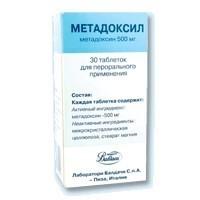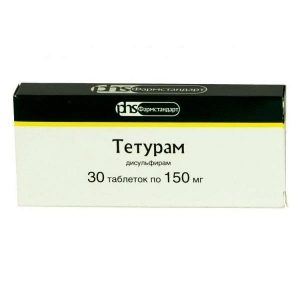Description
Latin name
Esperal
Packaging
In a plastic bottle 20 tablets. In a cardboard bundle 1 bottle.
Pharmacological action of
The action of disulfiram is based on the blockade of acetaldehydrogenase, which is involved in the metabolism of ethyl alcohol.
This leads to an increase in the concentration of the metabolite of ethyl alcohol – acetaldehyde, which causes negative sensations (flushing, nausea, vomiting, tachycardia, lowering blood pressure, etc.), which make drinking alcohol extremely unpleasant after taking the drug.
This leads to a conditioned reflex aversion to the taste and smell of alcohol.
The maximum therapeutic effect is achieved 12 hours after oral administration and can continue for 10-14 days after discontinuation of treatment.
Indications
Treatment and prevention of relapse of chronic alcoholism.
Additionally, the drug is used as a detoxification agent for chronic nickel poisoning.
Contraindications
– Severe liver failure.
– Diabetes mellitus.
– Epilepsy and convulsive syndrome of any origin.
– Mental Illness.
– Pregnancy.
– Lactation.
– Increased individual sensitivity to the drug.
Precautions: – Renal failure.
– Hypothyroidism.
Pregnancy and lactation
Pregnancy and lactation are contraindicated.
Composition
1 tablet contains: disulfiram – 0.5 g
Excipients: polyvidone K 30, carmellose sodium, magnesium stearate, microcrystalline cellulose, purified water.
Dosage and administration
Treatment is prescribed after a thorough examination of the patient and warning of the consequences and complications.
The drug is taken orally at 0, 5 g 1 time per day in the morning during meals according to an individual scheme, gradually reducing the dose to 1/2 or 1/4 tablets per day.
The dose can be changed in the direction of increase or decrease, depending on the patient’s response.
After 7-10 days, a teturamalcoholic test is carried out (20-30 ml of 40% ethanol (vodka) after taking 0.5 g of the drug), with a weak reaction, the dose of alcohol is increased by 10-20 ml (maximum dose of vodka is 100-120 ml).
The test is repeated after 1-2 days in the hospital and after 3-5 days on an outpatient basis, with the adjustment of doses of alcohol and / or the drug as necessary.
In the future, you can use a maintenance dose of 0.15-0.2 g per day for 1-3 years.
Side effects
Side effects due to disulfiram:
– metallic taste in the mouth
– unpleasant odor (due to carbon disulphide) in patients with a functioning colostomy
– rarely – hepatitis (noted in patients with chronic alcoholism and in some patients treated for nickel eczema)
– lower polyneuritis extremities
– neuropsychiatric disorders, memory loss, disorientation in time and space, asthenia
– headache
– skin allergic reactions
Side effects due to the association of disulfiram-ethanol:
– collapse, n Rushen heart rate, angina, myocardial infarction
– swelling of the brain, bleeding in the brain.
Drug Interaction
Contraindications:
Alcohol: intolerance reaction (ebb, erythema, vomiting, tachycardia). Alcohol and alcohol-containing medicines should be avoided. Unwanted combinations.
Isoniazid: impaired behavior and coordination.
Nitro-5-imidazoles (metronidazole, ornidazole, secnidazole, tinidazole): delirious disorders, confusion.
Phenytoin: a significant and rapid increase in the concentration of phenytoin in the blood plasma with toxic symptoms (inhibition of its metabolism).
If the combination cannot be avoided, clinical monitoring and monitoring of plasma concentrations of the drug should be performed during and after treatment with disulfiram.
Combinations with caution:
Warfarin (and other oral anticoagulants): increased effect of oral anticoagulants and risk of bleeding (decreased metabolism of warfarin in the liver). More frequent monitoring of the level of prothrombin in the blood and adjustment of the dose of anticoagulants within 8 days after discontinuation of disulfiram is recommended.
Theophylline: Disulfiram inhibits the metabolism of theophylline. As a result, the dose of theophylline should be adjusted (reduced dosage), depending on the clinical symptoms and the concentration of the drug in the plasma.
Benzodiazepines: Disulfiram can enhance the sedative effect of benzodiazepines by inhibiting their oxidative metabolism (especially chlordiazepoxide and diazepam). Benzodiazepine dosage should be adjusted according to clinical manifestations.
Tricyclic antidepressants: intensifying alcohol intolerance (if patients receiving disulfiram take alcohol).
Overdose
Combination with disulfiram – ethanol causes depression of consciousness, down to coma, cardiovascular collapse, neurological complications.
Treatment is symptomatic.
Storage conditions
List B. The drug should be stored in a dry place inaccessible to children at temperatures below 25 ° C.
The Expiration of
is 3 years.
Deystvuyuschee substances
Disulfiram
dosage form
dosage form
tablets
Sanofi-Aventis, France




